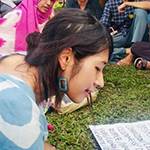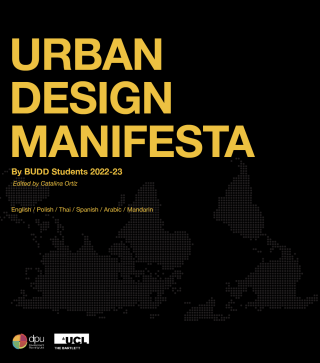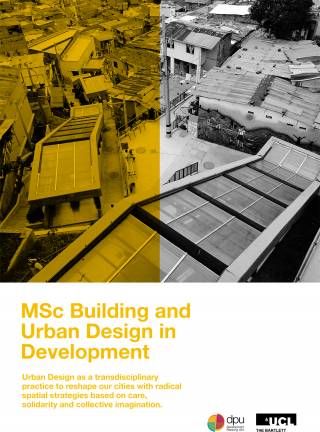The Building and Urban Design in Development MSc immerses students in the theory and practice of imagining and building just cities and communities.
About the course
We live in a broken world. As designers and urban practitioners we have the imperative to recalibrate the premises and priorities of the professional field that have also contributed to the civilisational crisis we are in. We ought to centre practices of care, solidarity and acknowledge the interdependence between people, planet and politics. We need to challenge the long term effects and living impacts of coloniality in the urban spaces we inhabit. That is why the Building and Urban Design in Development MSc is grounded into a design research approach in cities from a critical approach to city-making. We combine an exploration of the political, social, cultural and spatial elements that shape the production of urban spaces with the principles of an engaged, collective, active, reflexive and situated design.
The Building and Urban Design in Development MSc connects the methods and practice of an exquisitely ‘urban design' approach with a political economy view on space and power. We address the agency of design in a context where cities are increasingly shaped by neoliberal market-led policies that deepen inequality and increase the vulnerabilities of already marginalised communities. We address how the destructive effects of climate change and disasters overlap with protracted forms of displacement disproportionately affecting marginal urban districts.
Our course reframes our engagement with design to effectively respond to social, economic and environmental global urban challenges and to address transformative change in cities primarily located in the Global South. This unique approach enables our students to deal with the spatial manifestation of injustices, complex urban challenges and spatial transformations not as an isolated field of practice. The focus throughout the three academic terms is on the understanding of urban design, contested urbanisms in the Global south, the role of the urban practitioner and participatory approaches to urban transformations.
By the end of the Building and Urban Design in Development MSc, you will have:
- Developed a deeper understanding of the role of urban design as a transdisciplinary practice
- The ability to critically analyse, document and spatially visualise complex urban issues
- The confidence to design and propose strategies and interventions that are fundamentally rooted in social- environmental and spatial justice
- Experimented with the practice of urban design beyond the classroom environment through practice engagements with international partners
- Cultivated their capacity to grow professionally as a practitioner in urban development planning
- A deeper understanding of urban design and critical spatial practices globally – particularly in the Global South.
On this page
- Who should apply?
- Course structure
- Spatial Design Practices
- Careers and employability
- Staff
- More information
Who should apply?
We aim to cultivate socially sensitive urban practitioners who can promote spatial justice in the responses to challenges like marginalisation, inequality and environmental degradation. Therefore, the Building and Urban Design in Development MSc is suitable for graduates and professionals who want to engage with contemporary urban issues while acquiring the practical skills needed to deliver positive urban change.
We encourage a transdisciplinary approach to urban design. As such, we attract architects, urban planners, urban designers, geographers, social scientists, anthropologists, environmental scientists, artists and others with a passion for urban issues. This diversity fosters a cooperative working environment and the opportunity to negotiate creatively with others.
The Building and Urban Design in Development MSc is equally valuable for those with initial training in planning, architecture, urban design and landscape architecture, who wish to complete or expand their professional education. However, we also offer an invaluable grounded qualification for new entrants to the field. Our course is equally suited to those with professional experience or those with none. Students find that they form strong networks and collaborative working relationships that continue after the course has ended.
We provide an open space for learning and deepening our areas of interest related to transformative urban design. We explore several urban theories and methodologies complemented with multidimensional and multi scalar analysis to address urban inequalities and imbalance power relations that often shape human settlements.
Course structure
The Building and Urban Design in Development MSc represents approximately 1,800 hours of student learning time, and involves several activities such as online and face to face lectures, seminars, workshops, tutorials, field visits, field trip, project work, private reading, writing and revising for examinations. Full-time students should commit to an average of at least 35 hours of study a week throughout the programme of study. All other commitments should be secondary to this time.
Our course is organised into modules with each requiring a critical amount of learning time, measured in credits. For example, a 30-credit module involves around 300 hours of student learning time. 75% of the taught components of the programme (90 credits) are devoted to the core subjects of Building and Urban Design in Development. In comparison, 25% (30 credits) are reserved for an elective from a range of optional modules on offer. Core modules provide the theoretical and methodological components of the programme while optional modules allow students to examine different topics and approaches in accordance with their own particular interests.
Our teaching and learning approach
On the Building and Urban Design in Development MSc, we will introduce you to the methodology and framework for a critical participatory, community-based approach that paves the way to deconstruct urban design as a political economy of space and you will learn through a variety of learning activities including lectures, seminars, reading discussion forums, exercises and studio work.
You will also learn through London-based field work, our Urban Design Otherwise Conversations and our overseas practice engagement - in the first, second and third terms, respectively.
- Read more about our core modules
- Critical Urban Theory and Design covers a critical reflection on the epistemology of urban design in development. It offers a series of conceptual building blocks to construct a theoretical and critical understanding of it as a project of city making for collective existence. In term one, it introduces students to a common vocabulary of concepts and theories on urbanism, political economy of space, urban studies and urban sociology expanded with the use of critical theory, philosophy, and cultural studies. In term two, it delves into a series of case studies, in London and elsewhere, outlining a critique of the current practice of urban design: in so doing, it stimulates a discussion on a needed recalibration of methods and tools for urban analysis and intervention.
- Engaged Urban Design examines theories and practices of engagement by deconstructing its relationship with the processes that shape the built environment. By locating contemporary practices in the evolving dynamic of urbanization, capitalism, and democracy, this module explores the multiple meanings of an engaged urban design, linking theoretical debates with practice-based research. The module frames participatory processes as the negotiation of the social co-production of space. In doing so, it posits engaged urban design as a context-specific, power-laden, scale-sensitive, and time-space-dependent process of socio-spatial urban interventions. The module interrogates the role of engagement processes in southern urban practices and provides an analytical and methodological repertoire of engagement for city-making. In term one, the module frames urban design practices in the interplay of space, power and knowledge. In term two, the module aims to explore the ways in which critical, engaged and situated urban design practices can foster spatial justice.
- Spatial Design Practices brings together the inputs and reflection from different modules of the Building and Urban Design in Development MSc in a studio-based pedagogy. It offers the participants relevant concepts and skills relating to development, urban design and building processes, and allows engaging with the theory and methods of building and urban design through real case scenarios. During the first term students approach urban interventions in a comparative fashion, while investigating local areas’ and communities’ concerns and their spatial significance. Students will be gradually introduced to the design research process and develop the necessary skills to be employed during the Overseas Practice Engagement, developing across part of term two and then in term three, in collaboration with a network of institutional partners. Thus, rather than focusing on specific tools, the studio enables the emergence of a new learning mindset to approach urban processes and collaborative work.
- Read more about our optional modules
- Housing as Urbanism: Housing Policy and the Search for Scale reflects on the evolution of ideas and practices in the field of housing policies, in their direct connection with the wider context of development theories and strategies. It explores the changes in the role of different stakeholders, in the understanding of the multiple articulations of housing and urbanism and in the meaning and tools of scaling-up in housing provision. It pays particular attention to the convergence of debates on informality and housing as central to a major paradigmatic shift at conceptual and policy levels which will affect the direction of housing strategies far beyond just questions of informal housing.
- Housing Policies: Practical Dimensions and Alternative Options focuses on how interventions in housing can build on a complexity of sectoral inputs to produce multiple pro-poor development outcomes. Participants are exposed to a range of approaches to housing and settlement upgrading policy and practice. The roles of the state, market and civil society in housing and settlement upgrading are examined in different national contexts. The importance of land, finance, infrastructure, organisational capacity and governance are emphasised as well as the longer-term sustainability of different approaches.
- Disaster Risk Reduction in Cities provides a detailed examination and structured understanding of Disaster Studies and Disaster Risk Reduction, with specific reference to urban areas. It engages with extreme conditions of disasters and their social, physical and political implications on urban areas, the built environment and planning disciplines. Drawing from current research on the urban turn in Disaster Studies and the entanglements between Disaster Risk Reduction, Development processes and Urban Poverty, the module offers an introduction to the debate on urban resilience and its policy implications.
- Post Disaster Recovery: Policies, Practices and Alternatives provides a detailed and critical examination of post-disaster recovery practices and policies, with a particular focus on its institutional arrangements and socio-spatial implications. Drawing from transnational research experiences and connections with practitioners, humanitarian workers and development managers, the module reflects on the different challenges posed when working in a post disaster environment and implementing plans, projects and interventions.
Our students can also choose optional modules offered by other master's courses at The Bartlett Development Planning Unit, or modules offered by other departments within UCL as long as they do not clash with the core modules of the Building and Urban Design in Development MSc.
More details of these modules can be found in the UCL module catalogue.
Please note that the course structure and list of modules given here is indicative. This information is published a long time in advance of enrolment and module content and availability are subject to change.
Spatial Design Practices
Our overseas practice engagements are a core aspect of our 'Spatial Design Practices' core module. It is an immersive experience of design engagement with lived urban experiences in a city globally. Our most recent engagements have taken place in Medellin, Yangon, Phnom Penh, Bangkok, Istanbul and Mumbai.
In the past, we also hosted BUDDcamps - a three-day design workshop exercise in which Building and Urban Design in Development MSc students were exposed to the socio-spatial challenges of a particular place. Please note: BUDDcamps are not currently being offered by the Building and Urban Design in Development MSc.
Careers and employability
The programme enhances students skills in critical thinking, action research, spatial analysis, design research and creative practise, which are in demand in a variety of sectors around the world including:
- NGOs
- Aid and development agencies
- Social movements
- Community-led organisations
- Government organisations
- Urban think tanks
- Public agencies and institutions
- Architectural, planning and urban design practices.
Our course has also often inspired graduates to pursue further research at PhD level and to develop independent practices.
Our alumni in practice
Discover what alumni of the Building and Urban Design in Development MSc are doing in practice through their own reflections on the BUDD Alumni in Practice website.
What our alumni say
Watch the video from Building and Urban Design in Development MSc alumnus Akil to hear about his career trajectory since graduating from our course:
- Discover more alumni profiles from our Building and Urban Design in Development MSc alumni

“I am so grateful for the life-changing conversations I had and still have with my friends and the teachers on the Building and Urban Design in Development MSc, and for the precious lessons learned that I try to apply in my everyday practice and life. The most valuable ones for me are about the constant questioning of our role of practitioner, of our responsibility to deconstruct and decolonise design and knowledge, and the endless possibilities that open up when we act collectively”

“This course provides an open space for learning and deepening our areas of interest related to transformative urban design. It explores several urban theories and methodologies complemented with multidimensional and multi scalar analysis to address urban inequalities and imbalance power relations that often shape human settlements. ”

“One of the unexpected lessons was the importance of admitting emotion. This has been extremely relevant in reflecting on the positionality of practitioners and research ethics, and the course offered real experiences to encounter struggles, frustrations and anger”
Staff
The Building and Urban Design in Development MSc is delivered to our students by a group of academics, development professionals, architects, urbanists and planners with a broad scope of collective experience both in the theoretical construction of development practice - as well as our practice engagement - in rapidly developing cities.
Our lecturers particularly have expertise in post-disaster reconstruction, participatory design methodologies, livelihoods and capabilities of the urban poor, housing policy and finance, and knowledge of urban design's functioning and capacity for transformation as a political economy of space.
- Programme Leaders
Dr Giovanna Astolfo: Beyond the imperative of identifying commonalities, trends and patterns across cities, Giovanna's urban enquiries are connected by an abiding and incessant interest for the social and lived experiences of the often marginalised urban majority, their spatial provisions and power arrangements. Away from disciplinary categorisation, my research focuses on overlapping and inherently plural urbanisms –as the many ways people make space and themselves: unconventional, contested, improvised and feminist. Following the lead of many women researchers and activists before her, Giovanna's research practice aspires to be situated, reflexive, disobedient, critically inquisitive, and caring. View Giovanna's profile
Dr Catalina Ortiz: Catalina considers recalibrating knowledge production from the Global South as the main challenge of contemporary urbanism - that is why her quest on understanding the territorial and relational nature of urban spaces serves as the intellectual platform to guide my research and teaching. Catalina's areas of intellectual inquiry seek to understand the territorial and relational nature of urban spaces and the political economy of urban design. She is interested in disentangling the ways in which the transnational flows of urban models, ideas, and tools shape the built environment and the political process of space production in Global South cities. View Catalina's profile
- Graduate Teaching Assistant
Laia Garcia Fernandez: With a background in architecture, Laia is an active PhD Candidate at the University of Ferrara. With over seven years of experience in community-led initiatives and ecologically-responsible built interventions, she has taken part in different research and practice projects in East African countries and Europe. Specifically, she has worked alongside community-based organisations to provide access to sustainable public facilities to indigenous and vulnerable communities through processes of co-design and collaborative construction. In 2018 she co-founded a transdisciplinar Collective with the aim of promoting environmental justice through spatial interventions. Currently she is working as a consultant for a Foundation which focuses on women’s rights in Spain and Guinea Bissau, to achieve the sustainable construction of a participatory-led training centre and women shelter house. With a special attention to material ecologies, her research focuses on communities’ perception and practices of self-building and dwelling, with the objective of shaping future pathways to enable the ecological transformation of the built environment. Since 2019, Laia has been the Graduate Teaching Assistant of the Building and Urban Design in Development MSc. More recently, she joined a DPU-funded research project in Somaliland, to document the tangible and intangible heritage of Berbera’s building history.
- Teaching staff
Professor Camillo Boano: Camillo's research has centred on the complex encounters between critical theory, radical philosophy and urban design processes, specifically engaging with informal urbanisations, urban collective actions, as well as crisis-generated urbanisms. In doing so, he has been practicing, conceiving and teaching an idea of urban design that should be treated as part of an expanded field, where the many scales of architecture are manifested – from their urban manifestation to how building and spaces are conceived, occupied and used, incorporating objects, spaces and theories. Camillo is the author of different publications in academic journals as The Journal of Architecture, Disasters, The Journal of Urban Design, and The Journal of Developing Societies, among others, and he edited a book on humanitarian urbanism and refugee camps tiled Citta Nude. Iconografia dei campi profughi (2005, in Italian) of The Ethics of a Potential Urbanism: Critical Encounters Between Giorgio Agamben and Architecture (2017), and edited two books, Urban Geopolitics. Rethinking Planning in Contested Cities (2018) with Jonathan Rokem and Neoliberalism and Urban Development in Latin America: The Case of Santiago (2018) with Francisco Vergara-Perucich. View Camillo's profile
Dr Giorgio Talocci: Giorgio's research lies at the intersection between the urban design discipline and the field of governmental studies. He has long term research experience and a strong record of publications documenting and analysing exclusionary dynamics such as phenomena of displacement and ghettoisation, and how these emerge through processes of urban transformation. At the housing scale, Giorgio researches how the quest for housing affordability is ultimately embedded in the reproduction of neoliberal and profit-driven urbanism. At the same time, he looks at the emergence of counter-narratives of city-making, and question whether these configure as emancipatory, and for whom. Giorgio does so looking at forms of tangible and intangible heritage and how these are leveraged to produce alternative forms of urban life, or how – conversely – they might get co-opted or threatened throughout processes of urban and infrastructural development. Further, importantly, he enquires how the critical practice of/in the built environment attempts to address (and produce knowledge about) such exclusionary dynamics, with research and publications questioning the agency of reflexive and participatory design. View Giorgio’s profile
Jorge Fiori: Jorge's research and publications mainly focus on the interface of urbanism and urban social policy. In particular, he works on the search for a broader reasoning about housing densities and urban intensification and the place of an appropriate urbanism in addressing urban irregularity and informality. Jorge's special research interest is also on the relation of spatial strategies and scaling-up in slum upgrading and poverty alleviation. Amongst his publications, you can read 'Informal City: Design as Political Engagement', and 'Spatial Strategies and Urban Social Policy: Urbanism and Povert Reduction in the Favelas Rio de Janeiro'.
Professor Cassidy Johnson: Cassidy's current research interest span across the following themes: Disasters as a socially-constructed phenomenon, and the linkage between disasters and development; how our environment is shaped by the larger political economy in which we live?; the role of communities and local governments as central co-producers of responses to address disaster risks; the importance of disaggregated data for understanding the impacts of small-scale and everyday disasters, especially in informal settlements; environmental justice, risks and urban planning; evictions, resettlement and relocation; narratives of struggle and resistance; and post-disaster housing recovery. View Cassidy's profile
Tim Wickson: Tim is a Lecturer in Urban Development Planning with an academic background in both Modern History and Urban Development Planning. Tim has professional experience in a variety of planning and international development related roles, including time spent working in urban design and planning policy in the UK as well as impact evaluation for an international NGO working on the finance and delivery of slum-upgrading, affordable housing and basic-infrastructure projects.View Tim's profile
 Close
Close




